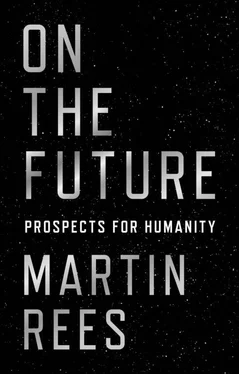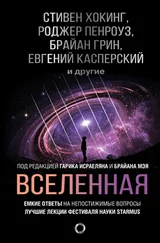Martin Rees
ON THE FUTURE
PROSPECTS FOR HUMANITY
THIS IS A BOOK ABOUT THE FUTURE.I write from a personal perspective, and in three modes: as a scientist, as a citizen, and as a worried member of the human species. The book’s unifying theme is that the flourishing of the world’s growing population depends on the wisdom with which science and technology is deployed.
Today’s young people can expect to live to the end of the century. So how can they ensure that ever more powerful technologies—bio, cyber, and AI—can open up a benign future, without threatening catastrophic downsides? The stakes are higher than ever before; what happens this century will resonate for thousands of years. In addressing such a wide-ranging theme I’m mindful that even the experts have a poor record of forecasting. But I’m unrepentant because it’s crucial to enhance public and political discourse on long-term scientific and global trends.
The themes of this book have evolved and clarified through lectures for varied audiences, including the 2010 BBC Reith Lectures, published as From Here to Infinity (Martin Rees, From Here to Infinity: Scientific Horizons [London: Profile Books, 2011; New York: W. W. Norton, 2012]). I’m therefore grateful for the feedback from listeners and readers. And I acknowledge with special gratitude the input (knowing or unknowing) from friends and colleagues with specialised expertise, who are not specifically quoted in the text. Among them are (alphabetically) Partha Dasgupta, Stu Feldman, Ian Golden, Demis Hassabis, Hugh Hunt, Charlie Kennel, David King, Seán Ó hÉigeartaigh, Catharine Rhodes, Richard Roberts, Eric Schmidt, and Julius Weitzdorfer.
I am specially grateful to Ingrid Gnerlich of Princeton University Press for instigating the book, and for her advice while I was writing it. I’m also grateful to Dawn Hall for the copyediting, to Julie Shawvan for the index, to Chris Ferrante for the text design, and to Jill Harris, Sara Henning-Stout, Alison Kalett, Debra Liese, Donna Liese, Arthur Werneck, and Kimberley Williams from the Press for their efficiency in seeing the book through the publishing process.
A COSMIC CAMEO:
Suppose aliens existed, and that some had been watching our planet for its entire forty-five million centuries, what would they have seen? Over most of that vast time-span, Earth’s appearance altered very gradually. Continents drifted; ice cover waxed and waned; successive species emerged, evolved, and became extinct.
But in just a tiny sliver of Earth’s history—the last hundred centuries—the patterns of vegetation altered much faster than before. This signalled the start of agriculture—and then urbanisation. The changes accelerated as human populations increased.
Then there were even faster changes. Within just fifty years the amount of carbon dioxide in the atmosphere began to rise abnormally fast. And something else unprecedented happened: rockets launched from the planet’s surface escaped the biosphere completely. Some were propelled into orbits around the Earth; some journeyed to the Moon and other planets.
The hypothetical aliens would know that Earth would gradually heat up, facing doom in about six billion years when the Sun would flare up and die. But could they have predicted this sudden ‘fever’ halfway through its life—these human-induced alterations—seemingly occurring with runaway speed?
If they continued to keep watch, what would they witness in the next century? Will a final spasm be followed by silence? Or will the planet’s ecology stabilise? And will an armada of rockets launched from Earth spawn new oases of life elsewhere?
This book offers some hopes, fears, and conjectures about what lies ahead. Surviving this century, and sustaining the longer-term future of our ever more vulnerable world, depends on accelerating some technologies, but responsibly restraining others. The challenges to governance are huge and daunting. I offer a personal perspective—writing partly as a scientist (an astronomer) but also as an anxious member of the human race.
* * *
For medieval Europeans, the entire cosmology—from creation to apocalypse—spanned only a few thousand years. We now envision time-spans a million times longer. But even in this vastly extended perspective, this century is special. It is the first when one species, ours, is so empowered and dominant that it has the planet’s future in its hands. We’ve entered an era that some geologists call the Anthropocene.
The ancients were bewildered and helpless in the face of floods and pestilences—and prone to irrational dread. Large parts of the Earth were terra incognita. The ancients’ cosmos was just the Sun and planets surrounded by the fixed stars spread across the ‘vault of heaven’. Today, we know our Sun is one of one hundred billion stars in our galaxy, which is itself one of at least one hundred billion other galaxies.
But despite these hugely stretched conceptual horizons—and despite our enhanced understanding of the natural world, and control over it—the timescale on which we can sensibly plan, or make confident forecasts, has become shorter rather than longer. Europe’s Middle Ages were turbulent and uncertain times. But these times played out against a ‘backdrop’ that changed little from one generation to the next; devotedly, medieval masons added bricks to cathedrals that would take a century to finish. But for us, unlike for them, the next century will be drastically different from the present. There has been an explosive disjunction between the ever-shortening timescales of social and technical change and the billion-year time-spans of biology, geology, and cosmology.
Humans are now so numerous and have such a heavy collective ‘footprint’ that they have the ability to transform, or even ravage, the entire biosphere. The world’s growing and more demanding population puts the natural environment under strain; peoples’ actions could trigger dangerous climate change and mass extinctions if ‘tipping points’ are crossed—outcomes that would bequeath a depleted and impoverished world to future generations. But to reduce these risks, we don’t need to put the brakes on technology; on the contrary, we need to enhance our understanding of nature and deploy appropriate technology more urgently. These are the themes of chapter 1of this book.
Most people in the world live better lives than their parents did—and the proportion in abject poverty has been falling. These improvements, against a backdrop of a fast-growing population, couldn’t have happened without advances in science and technology—which have been positive forces in the world. I argue in chapter 2that our lives, our health, and our environment can benefit still more from further progress in biotech, cybertech, robotics, and AI. To that extent, I am a techno-optimist. But there is a potential downside. These advances expose our ever more interconnected world to new vulnerabilities. Even within the next decade or two, technology will disrupt working patterns, national economies, and international relations. In an era when we are all becoming interconnected, when the disadvantaged are aware of their predicament, and when migration is easy, it is hard to be optimistic about a peaceful world if a chasm persists, as deep as it is in today’s geopolitics, between welfare levels and life chances in different regions. It is specially disquieting if advances in genetics and medicine that can enhance human lives are available to only a privileged few and portend more fundamental forms of inequality.
There are some who promote a rosy view of the future, enthusing about improvements in our moral sensitivities as well as in our material progress. I don’t share this perspective. There has plainly, thanks to technology, been a welcome improvement in most people’s lives and life chances—in education, health, and lifespan. However, the gulf between the way the world is and the way it could be is wider than it ever was. The lives of medieval people may have been miserable, but there was little that could have been done to improve those lives. In contrast, the plight of the ‘bottom billion’ in today’s world could be transformed by redistributing the wealth of the thousand richest people on the planet. Failure to respond to this humanitarian imperative, which nations have the power to remedy, surely casts doubt on any claims of institutional moral progress.
Читать дальше


![Мартин Рис - Всего шесть чисел. Главные силы, формирующие Вселенную [litres]](/books/414169/martin-ris-vsego-shest-chisel-glavnye-sily-formir-thumb.webp)









